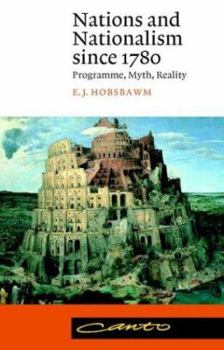Nations and Nationalism since 1780: Programme, Myth, Reality
Select Format
Select Condition 
Book Overview
Customer Reviews
Rated 5 starsThe red menace?
I am quite surprise with some reviewers and their obssesion with Marxism. Let me remind you that Berlin Wall has fallen down.The idological preferences of the author are well known, in fact after 1989 he is one of the few who still describes himself as a Communist. You can be agree with him or not, but what Hobsbawn does in this book is a very good analylis of Nationalism. From a marxist point of view? right. Is an option...
1Report
Rated 5 starsSuberb, arguably Hobsbawm's best single book.
"...no serious historian of nations and nationalism can be a committed political nationalist...Nationalism required too much belief in what is patently not so. As Renan said: `Getting its history wrong is part of being a nation.' This bold and principled comment, which is duly qualified in the ellipsis I left out, is near the beginning of one of the most liberating books on modern nationalism. This is a vital book which...
0Report
Rated 4 starsNationalism as progams and policies
Hobsbawm is a masterful historian, with the chops and interests to take on a variety of important topics. This book is his contribution to the Birth-of-Nationalism literature. Nationalism is often associated with questions of personal commitments or identity politics. This aspect of consciousness, however, is easy to assume, but more difficult to demonstrate, and even harder to historicize. As a result Hobsbawm begs...
0Report
Rated 5 starsA great book
I rather enjoyed this book. It was heavily referenced and insightful. The thesis is quite logical, and he backs up his assertion with more than enough evidence. It is also an interesting look at semiotics. I highly recommend this book.
0Report
Rated 4 starsHobsbawm At His Best - Once Again!
Hobsbawm's 'Nations and Nationalism' reveals once again the author's genius. Splendidly written, it is, first of all, a pleasure to read. With a wide range of examples, the British historian shows a truly cosmopolitan view of a rather narrow-minded phenomenon. Much more importantly, however, he unveils one of the great myths of populist rhetoric: that nations have always existed. Not only are they fairly recent developments,...
0Report














